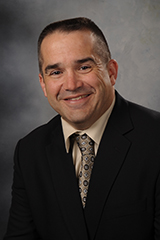February 9, 2021
Follow Up to Two Questions from the February Extension Update Tuesday Letter

Last Friday afternoon we had our February Extension Update. There were three questions that members of our Joint Council of Extension Professionals (JCEP) proposed for the February Extension Update. Because of limited time, I originally said I would carry over the third question to next month’s update, but I think I will address it now.
The question asked was:
“KSRE depends on government funding to provide much needed services for meeting our five Grand Challenges. How do we handle differences of opinion when colleagues criticize "the government" and these differences affect work culture and in some instances community partnerships?”
Professionally, I have taken the stand of not addressing politics. My perspective is that we are public servants, and, as such, we need to be in a position to work with politicians and the public whose political perspectives run the gamut. If I speak out against this party or that party in my professional role, it could end up jeopardizing our system.
Personally, of course, I do have political opinions. There is an old adage that one should never discuss politics in polite company. I usually refrain from talking politics except to those I completely trust will respect my right to have my own perspectives, values, opinions, and beliefs, even if mine differ from theirs. I also firmly believe that my friends and colleagues have the right to have their own perspectives, values, opinions, and beliefs. If I ever sense someone is uncomfortable discussing or even hearing such matters, I stay away from discussing either.
When it comes to talking politics in the workplace, my first question is “Why?” It is true that our funding and collaborations are often influenced by politics, but I have seen and experienced all parties do things that promote our missions, and I have seen and experienced all parties do things that were detrimental to our missions. There are appropriate discussions to have as a result of political decisions. We need to talk about enhancing and optimizing the budget we are given by the government. We need to discuss how to educate given a certain policy. We also need to determine how to best collaborate with an agency to address a critical issue. Nevertheless, what positive outcome can be achieved by expressing your political perspectives in the office? Is it worth alienating the colleague you are debating with (or those who are forced to hear your debate) in order to “win” a political argument?
My suggestion regarding political discussions in the workplace is this. If you want to have a political discussion with a colleague whom you are comfortable having such a discussion with (and vice versa), do so on your and your colleague’s personal time, and have that discussion away from the office. Our offices and meeting rooms are there for our team of extension professionals to gather in order to conduct our public education mission. Please do not let our facilities become a place for unproductive political-talk-show-like banter.
Another question that came up regarded whether we or our volunteers who have been vaccinated could forgo our mask protocols. I was not ready to address that on Friday, but I am today.
According to the Centers for Disease Control and Prevention, https://www.cdc.gov/coronavirus/2019-ncov/vaccines/faq.html#mask, there is not enough scientific information on the transmission of COVID-19 to say that a vaccinated person can go without a mask. In the absence of such information, mask wearing should be followed by those who have or haven’t been vaccinated.
I also asked our own Dr. Kyle Goerl of the Lafene Health Center the same question. His opinion concurs with that of the CDC. “For now, (it is) still important to wear a mask,” wrote Dr. Goerl.
Until we hear otherwise, mask wearing is still a necessity regardless of whether an extension professional, volunteer or participant has been vaccinated.